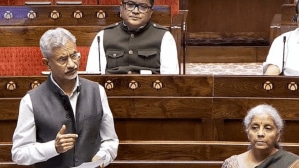Karnataka to levy 5% cess charge on e-commerce platforms to establish Gig Workers’ Welfare Board
Chief Minister Siddaramaiah announced the decision on Thursday after a meeting with Congress leader and Leader of Opposition in Lok Sabha, Rahul Gandhi.
 Taking a dig at the BJP for opposing the caste census till now, CM Siddaramaiah said the saffron party had argued that such an exercise would stir strife among various castes, alleging a conspiracy to divide the Hindu community in the country. (Express Photo)
Taking a dig at the BJP for opposing the caste census till now, CM Siddaramaiah said the saffron party had argued that such an exercise would stir strife among various castes, alleging a conspiracy to divide the Hindu community in the country. (Express Photo) To bolster the welfare of gig workers, Karnataka is set to levy a 5 per cent cess charge on e-commerce platforms to establish a welfare board.
Chief Minister Siddaramaiah announced this decision on Thursday after a meeting with Congress leader and Leader of Opposition in Lok Sabha, Rahul Gandhi, at his Delhi residence.
Siddaramaiah has said that a comprehensive Gig Workers’ Bill will be presented before the state Cabinet for approval.
Once the Bill is enacted, the workers employed by 12 major companies, including Amazon, Flipkart, Zomato, Swiggy, Ola, Uber, and Dunzo, will receive social security benefits, he said. A small amount — based on the distance travelled by the gig worker for delivering goods or providing services — will go to the welfare fund to be set up under the Act, the CM said.
The high-level meeting was attended by Karnataka Labour Minister Santosh Lad, IT-BT Minister Priyank Kharge, and Industries Minister M B Patil. It focused on implementing the Gig Workers’ Welfare Act—a key promise from the Congress party’s Bharat Jodo Yatra and election campaign.
The meeting arrived at three major decisions – setting up a dedicated board to oversee the welfare of gig workers; providing social security benefits such as health insurance, education support, and other protections typically unavailable to workers in the unorganised sector, and meeting the board expenses partly from the 5 per cent cess on payouts to gig workers by e-commerce and aggregator platforms.
Siddaramaiah said, “This is about building an inclusive economy where no one is left behind. The state government is committed to supplementing these funds to ensure comprehensive welfare schemes, aligning with the provisions of the Code on Social Security 2020, which allows platforms to contribute up to 5 per cent for such purposes”.
Apart from health insurance, the amount will be used to provide loans and other amenities for gig workers, he added.
This legislation, which was earlier deferred twice, aims to formalise the welfare framework, building on an earlier draft that proposed a 1-2 per cent cess per transaction but was stalled due to internal disagreements.
The meeting also saw the participation of gig worker representatives—Rakshitha Dev from Karnataka, Salahuddin from Hyderabad, and Nikhil Dev.
Labour Minister Santosh Lad, said, “Karnataka has already introduced Bills for workers’ gratuity and cinema workers’ rights. This is about dignity and security for those driving our modern economy.”
Industry bodies raise concerns
The announcement, however, has sparked criticism from industry bodies like NASSCOM and IAMAI that raised concerns about the potential burden on e-commerce firms, especially startups already grappling with thin margins. They fear that companies such as Amazon and Flipkart, which have significant operations in Karnataka, may face increased operational costs, though the state’s pledge to cover additional funding could ease some pressure.
Several concerns were also raised by aggregators and related tech companies when the Labour Department, opened it up for public consultation. This included data privacy concerns, queries on contributions by companies for the welfare of gig workers and broadening the definition of gig workers.
Previous dissent to Bill
The Gig Workers’ Bill had earlier run into rough weather in the past. The Bill, initially slated for 2024, was delayed due to conflicting views within the Karnataka government. While Labour Minister Lad championed the cause, IT-BT Minister Kharge and Industries Minister Patil had earlier raised concerns about its impact on the state’s startup ecosystem and industrial growth. The Delhi meeting appears to have resolved these tensions, with all ministers now aligned on the need for action.
Karnataka’s previous attempts to regulate e-commerce have also faced resistance. In 2021, lockdown restrictions limiting e-commerce to essential goods led to operational chaos, with delivery personnel harassed due to vague guidelines. More recently, the Karnataka Agricultural Produce Marketing (Regulation and Development) (Amendment) Bill of March 2025 brought e-commerce platforms under APMC oversight, mandating cess payments for agricultural sales—a move that drew objections from companies like Amazon and Big Basket over compliance complexities.












